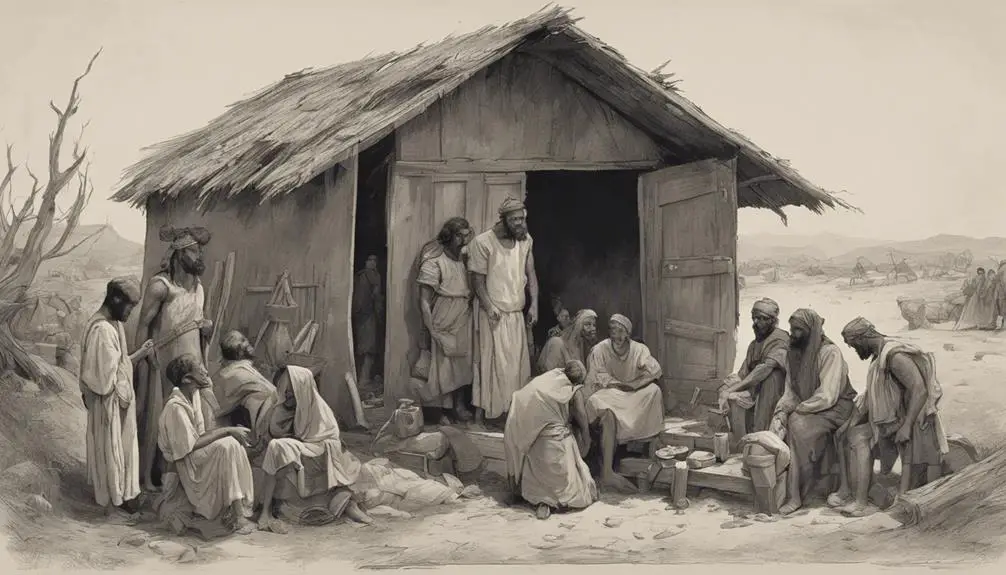Grappling with the concept of 'shacking' in the Bible uncovers intriguing interpretations and societal implications – a journey worth embarking upon.

Shacking in the Bible
Navigating the stormy seas of the Bible's stance on 'shacking', or cohabitation, isn't a walk in the park. You're challenged to interpret ancient texts and reconcile them with today's societal norms.
From the Old Testament's stern laws to the New Testament's nuanced views, the Bible offers multifaceted perspectives on living together before marriage. What underlying implications did 'shacking' have in biblical times?
How do modern interpretations and theological perspectives approach this issue? Let's set sail on this intriguing journey of exploration.
Key Takeaways
- Biblical perspectives largely uphold marriage as a sacred covenant, emphasizing sexual purity and warning against immorality.
- In biblical times, cohabitation outside of formal marriage was often socially unacceptable due to patriarchal societal norms.
- Modern cultural views consider cohabitation a normative relationship stage, breaking from traditional interpretations of biblical 'shacking'.
- The implications of cohabitation can significantly impact family dynamics, individual psychology, and carry legal and financial consequences.
Biblical Context of Cohabitation

To fully grasp the biblical perspective on cohabitation, often referred to as 'shacking', it's vital to rigorously analyse the scripture in its historical and cultural context. You must first understand the Cultural Influence and Marriage Traditions prevalent during biblical times.
In ancient Jewish society, marriage wasn't merely a personal agreement between two consenting adults. It was a community affair, with societal expectations and obligations deeply embedded. Cohabitation, as you understand it today, didn't exist in the same form. Instead, betrothal, a legally binding agreement often arranged by parents, preceded the marriage.
This cultural backdrop significantly shapes the Bible's view on cohabitation. The scripture's stance is reflective of the societal norms, traditions, and expectations of the period, rather than a standalone principle. The Bible's teachings, therefore, should be interpreted in light of this cultural influence and marriage traditions.
It's crucial to note that the Bible doesn't directly address 'shacking' as modern society defines it. Its teachings on sexual morality and marriage, however, provide insights into how cohabitation may be viewed from a biblical perspective. Remember, context is key when drawing conclusions from scriptural text.
Old Testament References

Delving into the Old Testament, you'll find several references that indirectly touch on the subject of cohabitation, offering valuable insights into the societal norms of the time. In the patriarchal narratives, for instance, you'll notice cohabitation occurring before, and often leading to, formal marriage, indicating a societal acceptance.
The Divine Relationships in the Old Testament further provide a context. For instance, God's relationship with Israel is depicted as a marriage, often referencing cohabitation. They lived together under a Covenant Symbolism, representing a sacred bond between God and His people.
The book of Exodus provides another indirect reference. In the Ten Commandments, you'll find an implicit reference to cohabitation in the prohibition of adultery. Here, the sanctity of the marital bed is emphasized.
In the poetic books, Song of Solomon presents an intimate portrayal of a couple's love, which may implicitly suggest cohabitation. It's critical, however, to interpret these references within their cultural and historical contexts.
New Testament Views

Moving into the New Testament, you'll encounter a shift in perspective on cohabitation. This era's views, heavily influenced by Apostle Teachings, placed more emphasis on marriage symbolism.
The New Testament often uses marriage as a symbol for the relationship between Christ and the Church. This deep spiritual implication underlines the sanctity and commitment inherent in marriage, which isn't found in cohabitation. The Apostle Paul's writings reinforce this idea, advocating for structured marital relationships over informal living arrangements.
To give you a clearer picture, here's a comparison of key New Testament scriptures:
Passage |
Message |
Implication |
|---|---|---|
Ephesians 5:22-33 |
Wives, submit to your own husbands, as to the Lord. |
Advocates for the structure and commitment found in married life. |
1 Corinthians 7:2 |
But because of the temptation to sexual immorality, each man should have his own wife and each woman her own husband. |
Encourages formal marital relationships over cohabitation. |
Matthew 19:4-6 |
So they are no longer two but one flesh. |
Highlights the unifying aspect of marriage, absent in shacking up. |
Hebrews 13:4 |
Let marriage be held in honor among all… |
Elevates the status of marriage over informal arrangements. |
1 Timothy 3:2 |
Therefore an overseer must be above reproach, the husband of one wife… |
Indicates the social and spiritual expectations tied to marriage. |
Social Implications in Bible Times

In examining the social implications in Bible times, it's important to understand that societal norms and expectations significantly influenced the views on cohabitation and marriage. Cultural norms weren't only strict but also deeply embedded in the daily life of individuals. Marriage traditions, for instance, played a crucial role in shaping the society's perception of relationships.
- Patriarchal Society: The Bible era was predominantly patriarchal. Men were the primary authority figures, and women's roles were largely defined in relation to men. This societal structure influenced the dynamics of relationships and marriages significantly.
- Marriage as a Social Contract: Marriage wasn't just about love; it was a social contract with economic, social, and political implications. It determined property rights, alliances, and social status.
- Cohabitation: Unlike today, cohabitation outside of marriage wasn't widely accepted. It was seen as a violation of cultural norms and could lead to social ostracism.
Modern Interpretations of 'Shacking

Reinterpreting 'shacking' in contemporary times, you'll find perspectives that starkly contrast with those from the Bible era. In the modern lens, cultural influences and relationship dynamics play significant roles in shaping our understanding of 'shacking'.
You'll notice that cultural influences have significantly shifted the perception of 'shacking'. Western societies, in particular, have embraced cohabitation as a normative stage in romantic relationships. This shift reflects a wider societal change towards individualism and away from traditional values. The impact of these cultural influences is profound, reshaping attitudes towards 'shacking'.
Simultaneously, understanding of relationship dynamics has evolved. 'Shacking' is no longer merely about a physical arrangement but encompasses emotional, mental, and financial aspects of a relationship. It's viewed as a trial period, a time to test compatibility and commitment. This modern interpretation acknowledges the complex nature of relationships, promoting open dialogue and equal partnership.
In this light, 'shacking' isn't synonymous with sin or moral lapse as it was during the Bible era. It's seen as a pragmatic, even beneficial, step in romantic relationships. Yet, it's important to note that these interpretations aren't universally accepted, with some cultures and religions maintaining traditional views on cohabitation.
Theological Perspectives on Cohabitation

Despite the evolving views on cohabitation, you'll find a multitude of theological perspectives that still uphold traditional interpretations of 'shacking'. They focus on marital expectations and spiritual consequences of cohabitation before marriage.
- Marital Expectations: Many theological perspectives assert that cohabitation undermines the commitment inherent in marriage vows. They believe it lowers the sanctity and seriousness of marital expectations.
- Spiritual Consequences: Cohabitation before marriage is viewed by some as a sin, with potential spiritual consequences. This belief stems from various biblical interpretations that suggest sexual relations outside of marriage aren't in alignment with God's will.
- Divine Design: Theological perspectives often emphasize that God's design for human relationships involves marriage. Cohabitation, thus, is seen as a deviation from this divine blueprint.
You'll observe that these perspectives aren't universal; they vary based on individual interpretations, cultural contexts, and personal beliefs. However, the common thread across all is the emphasis on marriage as a sacred covenant, not to be taken lightly. Therefore, while society's norms continue to evolve, it's essential to consider these theological perspectives when discussing cohabitation and its implications.
Frequently Asked Questions
How Did Cultural Norms of the Time Influence the Biblical Stance on Cohabitation?
You're examining how cultural influences shaped biblical interpretations on cohabitation.
During biblical times, societal norms heavily influenced scriptural views. Cohabitation, or 'shacking', was largely frowned upon, as marriage was seen as the proper setting for a couple's union.
This cultural norm likely reinforced the biblical stance, demonstrating how societal values can deeply influence religious doctrines.
Are There Any Biblical Characters Who Defied the Conventional Norms and Lived Together Without Marriage?
You're asking if any biblical figures bucked tradition and cohabited without marriage. While specific examples aren't plentiful, it's crucial to note the lifestyles of unmarried prophets.
They often lived communally, challenging conventional norms. Additionally, biblical polygamy, though not cohabitation in the modern sense, did defy the one-man-one-woman model.
These situations suggest there were different living arrangements, perhaps not entirely sanctioned, yet existing within the biblical narrative.
What Are Some Common Misconceptions About the Bible's Views on Cohabitation?
You might think the Bible condemns all cohabitation, but that's a common misconception. It's not about living arrangements, but sexual purity misunderstandings.
The Bible primarily focuses on maintaining sexual purity, not necessarily forbidding cohabitation. However, the consequences of cohabitation can lead to temptations that potentially compromise this purity.
It's more about the actions within the cohabiting relationship, not the act of cohabitation itself.
How Does the Concept of 'Shacking' Relate to Other Religious Texts Outside of the Bible?
When exploring 'shacking' interpretations in comparative religion, you'll find differing views. Some religions, like Buddhism, don't explicitly address cohabitation. Hinduism, on the other hand, generally discourages it. Islam strictly prohibits it unless married.
It's essential to remember that interpretations can vary widely within each religion, much like in Christianity. Always consider cultural, historical, and personal perspectives when examining religious texts.
What Are the Practical Implications of 'Shacking' in the Current Societal Context, Based on Biblical Teachings?
In today's society, 'shacking' can raise ethical questions. You might wrestle with whether it aligns with your personal values or societal expectations.
It's not just about cohabitation, it's about the commitment, respect, and trust involved. Biblical interpretations may influence your perspective, but they're not the only factor.
Weigh the practical implications, consider the potential effects on your relationships, and make an informed decision.
Conclusion
In wrapping up, it's clear that the Bible's stance on cohabitation, or 'shacking', isn't straightforward. Ancient scriptures reflect societal norms of their time, not necessarily ours. Interpretations vary widely, influenced by cultural, historical, and theological perspectives.
What's vital is to approach this topic with respect and understanding, acknowledging the complexity of the issue and the diversity of beliefs surrounding 'shacking' in the Bible. Ultimately, personal discernment and faith play a significant role.



Sign up